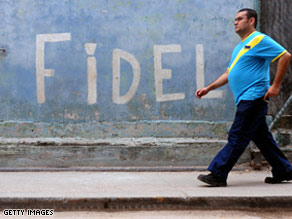
Fidel Castro led Cuba's communist revolution in 1959 and recently handed over power to his brother Raul.
And 71 percent of those polled said that the U.S. should reestablish diplomatic relations with Cuba, while 27 percent opposed such a move.
Both questions had a sampling error of plus or minus 3 percentage points.
The Obama administration has signaled that new rules on family travel and remittances to Cuba may be announced before President Obama goes to the Summit of the Americas on April 17.
A group of senators and other supporters unveiled a bill March 31 to lift the 47-year-old travel ban to Cuba.
"I think that we finally reached a new watermark here on this issue," said Sen. Byron Dorgan, D-North Dakota, one of the bill's sponsors.
Sen. Richard Lugar, R-Indiana, another sponsor of the bill, issued a draft report in February that said it was time to reconsider the economic sanctions. Lugar is the ranking Republican on the Senate Foreign Relations Committee.
"Republicans as well as Democrats favor reestablishing diplomatic relations with Cuba," CNN polling director Keating Holland said. "On the issue of lifting travel restrictions, Republicans are evenly divided, while independents and Democrats support the change."
A delegation from the Congressional Black Caucus traveled to Cuba earlier this week to find out if Cuba was interested in resuming relations with the U.S., said Rep. Barbara Lee, D-California, a member of the delegation.
"We have to remember that every country in Latin America, 15 countries, have normal relations with Cuba," Lee said. "We're the country which is isolated."
Lee said that Cuba has no preconditions on resuming relations.
The trip prompted a pair of Republican congressmen to rip the Black Caucus members for ignoring Cuba's "myriad gross human rights abuses," saying the trip to the island nation ignored the plight of political prisoners under the Castro regime.
Don't Miss
Cuban-American members of Congress, regardless of party affiliation, have voiced outrage over the easing of relations.
Florida Republican Sen. Mel Martinez, who was born in Cuba, doesn't want to see changes to the embargo.
"Having tourists on Cuban beaches is not going to achieve democratic change in Cuba," Martinez has said.
New Jersey Sen. Robert Menendez, a Democrat and Cuban-American, said in a recent speech that the Cuban government is "pure and simple a brutal dictatorship. ... The average Cuban lives on an income of less than a dollar a day."
Obama has said he is in favor of changing the relationship with Cuba. The $410 billion budget Obama signed in March makes it easier for Cuban-Americans to travel to Cuba and to send money to family members on the island. It could also allow the sale of agricultural and pharmaceutical products to Cuba.
Three provisions attached to the omnibus spending bill loosened restrictions enacted by former President Bush after he came to office in 2001.

Fidel Castro led the 1959 revolution that overthrew Cuba's Batista dictatorship. The United States broke diplomatic ties with the nation in 1961. The next year, the U.S. government instituted a trade embargo. Both policies remain in effect.  Interactive: A look at the Fidel Castro's life »
Interactive: A look at the Fidel Castro's life »
CNN's Ed Hornick contributed to this report.
Let The Sun Shine In......




No comments:
Post a Comment
We post comments in English and only by followers of this blog. While anyone is free to read any of the material here, comments from self-identified, moderate to left-of-center independents are welcome to post after joining up. Others may comment by email and will occasionally be posted as well.